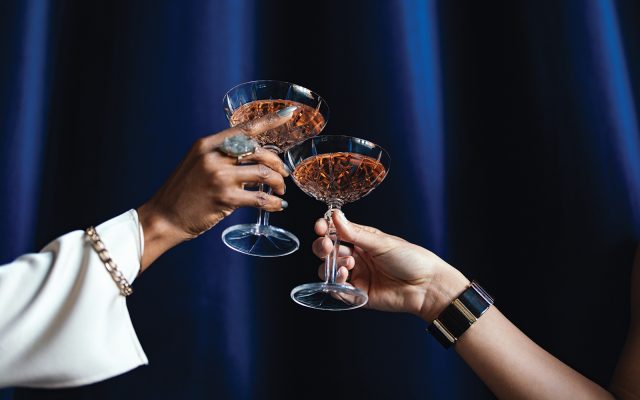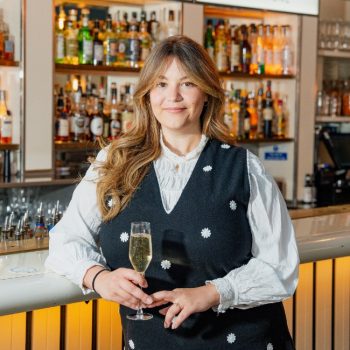Glass half full: evaluating the global bar scene
Every year, we publish our Global Bar Report – this year, we’ve discovered that the sector is facing many challenges, including economic ones, but also opportunities.

*This feature was originally published in the November 2024 issue of The Spirits Business magazine.
Summing up the global bar world in just one report is a near-impossible task – but it’s one we like to attempt every year. For the past few years, discussions about the industry have mainly focused on its response to and recovery from the Covid-19 pandemic. As we approach five years since the virus was identified, we’re perhaps finally able to move on to other topics. Unfortunately, there are other challenges – many of which have been plaguing the sector for far longer than the pandemic did. From rising prices of ingredients, staffing costs, and rents, to sexual harassment, mental health challenges, and a lack of diversity and inclusion, there are still plenty of struggles for bars and the people who work in them.
While many of us in the industry love what we do, the bar business is just that – a business. The economic landscape has been anything but smooth for most industries in recent years. The cost of ingredients has rocketed, and the sector is grappling with rising rents and energy bills.
So far this year in the UK, bar chains have failed to report any sales growth, according to CGA data. Things are faring better in the US, with the bar and nightclub sector worth a record-breaking US$35.3 billion dollars in 2022, according to the Statista Research Department – a 54% increase on 2021, and 12.7% higher than in 2019 before the pandemic took hold.
Inflation is also not deterring US consumers: according to CGA’s USA Category Channel Report 2024, more than a third of respondents plan to go out more than they did in 2023, while 42% plan to do so as often as they did last year.
CGA’s research also suggests weekly engagement with the on-premise is higher in Asia and Africa. In the next few days, we’ll be publishing reports on different regions, with an in-depth look at the economic challenges and opportunities for each.

Sadly, there’s no easy solution to these problems, but it’s worth bearing in mind that, generally, consumers’ wallets are far from healthy, and strategies need to adapt to suit. Coral Anderson, managing director at Swift in London, believes one trick lies in balancing value and quality: “It’s about giving people a premium product, but at as accessible a price point as possible.” She points to her bar’s aperitivo menu, which favours fortified wines and vermouths over spirits, offering cost benefits to both consumers and the bar, while still creating high-quality serves.
A hostile sector?
Beyond economic factors, as a place of community and hospitality, social issues can often be at the forefront of the bar scene. Inclusivity and representation of all kinds have sparked many conversations in the industry – with many believing the sector’s time as a male-dominated space is over.
But there is still work to be done. According to the FTSE Women Leaders Review, published in February 2024, the UK travel and leisure sector, which comprises on-trade businesses including Mitchells & Butlers and JD Wetherspoon, has, on average, 34.2% women in senior leadership. This is slightly above the average for FTSE 250 businesses, which is at 33.9%.
Is the on-trade a particularly hostile sector for women and non-binary people? One news story from the past year sticks out. In August, Australian bar and restaurant group Swillhouse became the centre of sexual misconduct allegations following an investigation by the Sydney Morning Herald. The allegations included a claim that management at Swillhouse-owned whisky bar The Baxter Inn allegedly offered a bottle of 1982 Penfolds Grange to the first employee to have sex with a customer.
While this behaviour is abhorrent, and hopefully not reflective of the whole industry, it’s an indication of how sexual discrimination can thrive – and how management can sometimes fall short of their duty to support staff. A survey by Celebrate Her conducted in 2021 found that only 33% of hospitality workplaces had employee-safety policies in place. It also found 91% of women working in hospitality feel unsafe going home from work. With the industry frequently asking staff to work late into the night, should managers consider arranging taxis, and check staff get home safely?

Stopping harassment is important for everyone in a bar setting, not just staff. Safe Bars is a US non-profit that trains on-trade venues to recognise and intervene in problematic behaviours, focusing on bystander intervention and de-escalation. Its executive director, Amie Ward, says: “Harassment happens in every direction – it is guest to guest, guest to staff, staff to staff, staff to guest.”
If she could give one tip for protecting staff and guests, she suggests this: “When you see something, do something. As a society, we’ve been taught to mind our own business and let people handle things on their own – but as the people who create the experience for the guests who walk through our doors, we need to create a safe environment for them as well.”
Diversity and inclusion
The on-trade has historically not always been a great place for people of colour, either. A number of organisations are hoping to reverse that – including Brown & Balanced, which celebrates Black bar and hospitality professionals in the US through events and virtual discussions, and Turning Tables Nola, which offers an ‘externship’ programme in New Orleans’ top restaurants, bars, nightclubs and music venues.
In the UK, in 2020 Equal Measures was founded to raise awareness about the importance of diversity in the UK on-trade. “I faced a lot of barriers – systemic racism, unconscious bias, and a lot of issues where I felt like I was unable to reach my full potential,” founder Deano Moncrieffe told The Spirits Business Podcast this year. “I also experienced some quite extreme racism along the way.”
But despite the work Equal Measures is doing, the problems persist. In the same podcast, Moncrieffe related a conversation he had recently had with someone, who had a customer refuse to be served by them because they were Black – and the manager’s solution was to move the bartender to another bar, instead of dealing with the guest. He’s also heard of establishments in London that are excluding people of colour from recruitment.
Health and wealth
With racism and sexism still sadly prevalent, it’s perhaps no surprise that some people find the on-trade a challenging place to work. Another key issue for hospitality staff is mental health. The long hours, late shifts, high-pressure environments and easy access to alcohol often lead to burnout. A recent study by mental health tool R;pple found 59% of hospitality workers have struggled with their mental health at work, with one in two having thought of suicide, self-harm or other harmful, negative thoughts – that’s the majority of people in our industry.
While the statistics may be shocking, help is available. Organisations such as the UK’s Healthy Hospo provide resources, training and support networks to help workers maintain their mental and physical wellbeing, while Another Round Another Rally in the US offers emergency financial aid for struggling hospitality workers, as well as grants and scholarships for those looking to advance their careers.
The Healthtender, created by Safe Bars’ Ward, focuses more on physical health, which she believes is vastly underappreciated in the sector. “People in the hospitality industry are athletes. They work these marathon shifts. And on top of it being physically demanding, they do a lot of emotional mental labour as well, and they’re not taking care of themselves,” she explains. With The Healthtender, she shares easy, cost-effective ways for bartenders to take care of themselves, from adjusting their stance at the bar to protect their backs to making sure there’s always a bottle of water, and nutritious snacks close by.
These organisations are doing fantastic work – but on-trade businesses also need to take responsibility for the workplace environments they’re creating. More flexible working conditions, including shorter shifts or better financial compensation, can create a healthier, more engaged workforce that doesn’t need to rely on external organisations to survive.
Swift in London has implemented a four-day week for all staff. “We’re just trying to change the hospitality model into a more sustainable one,” explains Anderson. “We’re making sure the people we employ can work with empathy and give the best possible hospitable service, because they themselves are happy.” Most people leaving the business do so “to do something deeply cool”, says Anderson – for instance moving abroad – rather than simply moving onto a different bar. She adds that this has huge economic benefits for the business, as hiring and training new staff is a huge drain on resources.
Those are the challenges facing our sector – but there is plenty to celebrate, too. Over the next few days, we will explore the on-trade by region, with three bars to watch in each, and profile nine leaders who are making the industry a better place.
Trade insights with Britney Chen, brand ambassador and global PR officer, Kavalan
What is your brand doing to support on-trade businesses financially?
“Kavalan actively supports on-trade partners through exclusive pricing, promotional campaigns, and collaborative marketing. We also facilitate guest bartender events with renowned international mixologists at the Kavalan Whisky Bar, and send our bartenders abroad to showcase our whisky’s versatility. These initiatives boost visibility and engagement for our partners. As part of King Car Group, we offer joint promotions with other beverage products to create a holistic dining experience that differentiates our partners in the market.”
How can businesses support their staff when it comes to mental health?
“Kavalan addresses mental health proactively by collaborating with mental health experts to provide workshops on stress management and wellbeing, specifically tailored for the hospitality sector. We also emphasise structured mentorship and flexible work arrangements to create a balanced and supportive work environment. Our open communication policy ensures that staff can freely discuss their mental health needs, fostering a culture of care and support.”
How does your brand support environmental sustainability in the on-trade?
“Kavalan is committed to sustainability by prioritising local sourcing and a zero-waste approach in our operations.
“When designing cocktail menus, we focus on using locally sourced, environmentally friendly ingredients such as Taiwanese fruits, vegetables, and tea leaves. This not only strengthens Kavalan’s connection to Taiwan’s rich agricultural heritage but also reduces our carbon footprint and minimises resource waste.
“For example, we ensure that ingredients like citrus fruits are fully utilised – incorporating peels, juice, and oils into various cocktails.
“Additionally, we educate our on-trade partners on sustainable practices, helping them adopt eco-friendly measures like local sourcing and waste reduction, further extending our sustainability efforts beyond our own venues.
“This holistic approach reinforces our commitment to environmental responsibility while showcasing the unique flavours of Taiwan.”
Related news
Disaronno grows in UK on-trade
